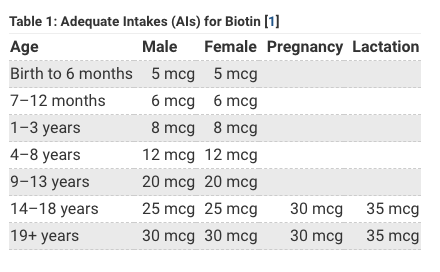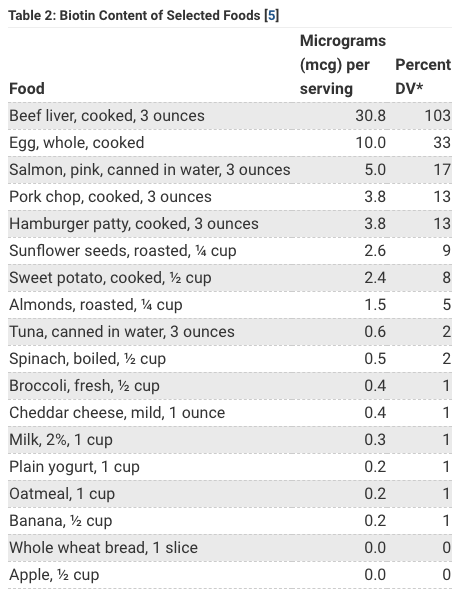# Understanding Biotin: Key Insights into Its Role in Health
Written on
Chapter 1: The Importance of Biotin
Biotin, also referred to as Vitamin H, is a vital nutrient that supports both metabolic and immune health. This article aims to highlight the functions of biotin, the consequences of its deficiency, and effective ways to ensure adequate intake through diet or supplements.
Micronutrients, including vitamins and minerals, are essential for our body's optimal functioning. An imbalance—whether through deficiency or excess—can lead to a range of health complications. Biotin, in particular, is crucial for metabolic processes, and its absence can disrupt energy production and immune responses.

Section 1.1: Functions and Benefits of Biotin
Biotin is fundamental for various health functions, primarily due to its role in cellular metabolism. According to a review in the Canadian Journal of Physiology and Pharmacology, biotin is essential for processes like gluconeogenesis, fatty acid synthesis, and the metabolism of branched-chain amino acids (BCAAs).
In simpler terms, biotin influences how our bodies process carbohydrates, fats, and proteins, making it critical for energy production. The gluconeogenesis process is particularly noteworthy; it allows the body to convert amino acids into glucose when food is scarce, providing necessary energy for organs such as the heart and brain.
The ability to generate energy during fasting is a testament to the body's efficiency. This metabolic flexibility has supported human survival through periods of food scarcity, and I have personally experienced its benefits on a ketogenic diet.
In my experience, increasing biotin intake through foods like egg yolks and beef liver has helped maintain my hair health. Conversely, a lower biotin intake in my younger years correlated with more hair loss and skin issues.
Section 1.2: Implications of Biotin Deficiency
Biotin's involvement in glucose, fat, and protein metabolism means that a deficiency can lead to significant metabolic and immune challenges. Insufficient energy production can affect both physical and mental health, while chronic inflammation—a common issue linked to deficiencies—can lead to numerous health problems.
Despite its importance, biotin deficiency is relatively uncommon. Nevertheless, it can occur due to genetic conditions or surgical interventions affecting nutrient absorption. For most, dietary adjustments and supplementation can effectively address any shortfall, provided guidance is obtained from healthcare professionals.
The National Institutes of Health (NIH) note that untreated biotinidase deficiency can lead to severe neurological symptoms. While no established Recommended Dietary Allowance (RDA) exists for biotin, general guidelines suggest the following intake:
- Birth to three years: 10-20 mcg
- Ages four to six: 25 mcg
- Ages seven to ten: 30 mcg
- Adolescents and adults: 30-100 mcg

Chapter 2: Identifying Risk Groups for Biotin Deficiency
Certain populations are more susceptible to biotin deficiency. Chronic alcohol consumption can inhibit biotin absorption and lead to lower plasma concentrations, affecting up to 15% of individuals with alcohol use disorders. Additionally, pregnant and breastfeeding women may experience marginal deficiencies, as their biotin levels can drop even with adequate dietary intake.
Section 2.1: Dietary Sources of Biotin
Fortunately, biotin is available from both animal and plant sources, with animal foods generally providing higher concentrations. In my opinion, beef liver stands out as an unparalleled source of biotin and other essential nutrients. Before incorporating liver into my diet, I relied on egg yolks for biotin.
Plant-based sources rich in biotin include sunflower seeds and almonds, though I found that overconsumption of nuts during plant-based diets could lead to weight gain.

Section 2.2: Supplementation Considerations
Biotin supplements are widely available and generally considered safe at doses around 100 mcg. Importantly, high doses do not appear to be toxic. However, individuals must be cautious, as biotin can interfere with certain blood tests, potentially leading to inaccurate results.
Additionally, biotin may interact with medications such as anticonvulsants, necessitating professional guidance prior to supplementation.
Conclusions and Key Takeaways
Biotin is essential for metabolic and immune health, and maintaining adequate levels is crucial. While food sources are the best way to ensure sufficient intake, supplementation may be necessary for specific populations, particularly those at risk for deficiency.
Pregnant and breastfeeding women, as well as individuals who consume excessive alcohol, should be particularly mindful of their biotin levels. While supplementation appears safe, it is wise to consult with healthcare professionals to avoid potential interactions with medications and to ensure optimal health outcomes.
Thank you for engaging with my insights on biotin. May you lead a healthy and fulfilling life!